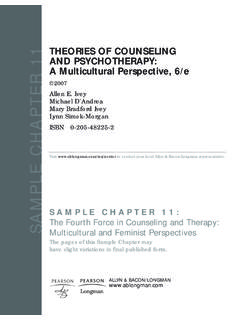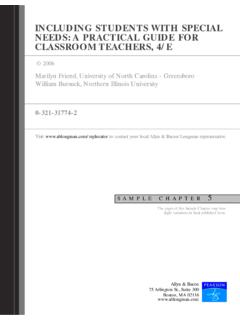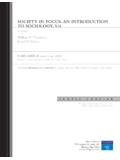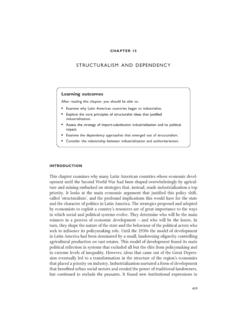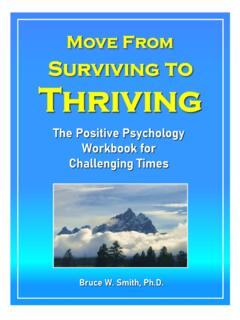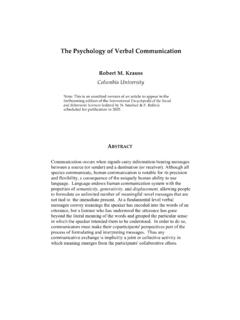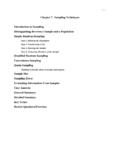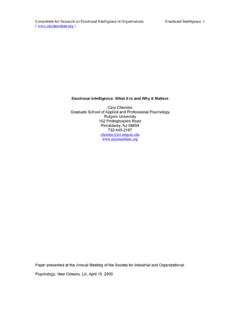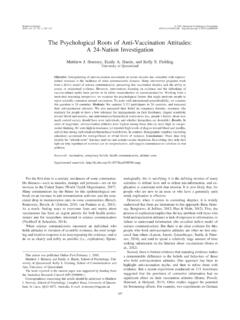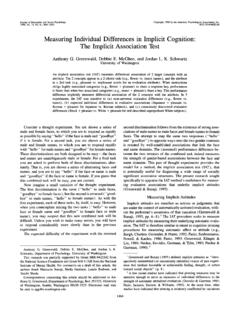Transcription of The Experimental Research Approach - Higher Education
1 64 The Experimental Research Approach3 Experimental ResearchCausationDefinitionAdvantages andSettingsDisadvantagesTypesWays to 5/22/2003 9:41 AM Page 64In June 1999, the American Psychological Association published a special issue of TheMonitoron psychology and cancer. The thrust of this special issue was the contributionmade by psychology in cancer Research and cancer caregiving. At first glance, it mayseem strange to focus on the role of psychology in cancer because cancer is typicallythought of as a physical disorder with little or no psychological component. However,we are increasingly finding that the mind and the body are not separate entities but areinterconnected.
2 One has only to be associated with a cancer patient to realize the psy-chological impact of this , for example, the case of Mrs. A, a forty-nine-year-old A s mother was diagnosed with cancer when she was twelve. For the next five years, Mrs. A s mother underwent a series of treatments consisting of a radicalmastectomy, radiation that burned and scarred her skin, and chemotherapy so toxicthat it left her crouched on her hands and knees, vomiting onto newspapers by herbed. Mrs A s mother was totally devastated by her illness and forced her daughter to be her only caregiver while at the same time forcing her husband out of the bed-room.
3 By the time her mother died, Mrs. A had become her virtual slave. Today, Mrs. Ais not only filled with rage at the disease that robbed her of her childhood, but she isalso a patient at a high-risk clinic designed to educate women about breast cancerprevention and help them manage their emotions (Clay, 1999). This is just one exam-ple of the emotional turmoil that may accompany what kind of contribution can psychology make to cancer Research and treat-ment? Remember that cancer can cause emotional turmoil not only in the cancervictim but also in the caregivers of the victim and other family members.
4 Is it possi-ble that a psychological intervention, or psychotherapy, can assist in preventing can-cer or even prolong life in those that have cancer? We know that prolonged stressaffects just about every system in the body. This leads to the question of whetherindividuals living in very stressful conditions are more susceptible to cancer. Ifresearch demonstrates that they are, can a stress management program reduce therisk of developing cancer? Many other legitimate questions could also be are questions that need to be asked and that are currently being do we seek the answers to these questions?
5 The primary way in whichresearchers have begun to provide answers to these questions is by conducting apsychological experiment or using the Experimental Research Approach , theapproach discussed in this 5/22/2003 9:41 AM Page 65 Chapter PreviewIn the present chapter I discuss the Experimental Research Approach . This is theresearch Approach that is typically used to investigate causality. Although otherapproaches are used, the Experimental Approach is the primary one because of itscharacteristics. Because causality is the type of relationship investigated whenusing the Experimental Research Approach , one might assume that we have agood understanding of the meaning of causality and how to identify causal rela-tionships.
6 This is an inaccurate assumption. To drive this point home, I first dis-cuss the meaning of causationand, hopefully, convince you that it is difficult toidentify causality. Then I discuss the characteristics of the Experimental researchapproach, its advantages and disadvantages, and the settings in which psycholog-ical experiments are Experimental Research approachis a quantitative Approach designed todiscover the effects of presumed causes. The key feature of this Approach is thatone thing is deliberately varied to see what happens to something else, or to dis-cover the effects of presumed causes.
7 This is something that people do all the example, individuals try different diets or exercise to see if they will loseweight. Others may get an Education to see if that will lead to a better job. Stillother individuals may change their diet to see if it will lower their blood cholesterollevel. As you can see, both scientists and nonscientists use experimentation to tryto identify causal relationships. However, scientific experimentation differs fromnonscientific experimentation in that the scientist makes a deliberate attempt tomake observations that are free of bias. Both approaches attempt to identify causalrelationships.
8 I therefore begin by exploring the concept of causation and then dis-cuss scientific experimentation and the nature of causation that experiments one of those terms that people frequently use but often don t reallyunderstand. People ask questions like What causes cancer? What causes a per-son to murder someone else? What causes a man to beat his wife? What dothey really mean? Common sense suggests that causality refers to a condition inwhich one event the cause generates another event the effect. However,causality is much more individuals discuss the effects of events, they tend to use the words causeand effectrather informally.
9 People are likely to assume that manipulation isimplicit in the concept of causation. If we manipulate or do something, we expectsomething else to happen. If something does happen, the thing or event wemanipulate is called the causeand what happens is called the example, ifwe spank a child for coloring on a wall and then observe that he no longer colorson the wall, we assume that the spanking caused the child to stop the temporal relationship between events such as spanking and ceasing a behav-ior such as coloring on a wall gives people an intuitive sense that they understand66|The Experimental Research ApproachCausationA term whose meaning isdebated by philosophers.
10 But that in everydaylanguage seems to implythat manipulation of oneevent produces anothereventExperimental researchapproachThe Research Approach inwhich one attempts todiscover the effects ofpresumed 5/22/2003 9:41 AM Page 66the meaning of cause and effect. However, the definition of these terms has eludedphilosophers for intuitive definition most of us have is that a causeis something that makessomething else exist. However, this intuitive definition of cause is far too simplisticbecause all causal relationships are contextually dependent. For example, depres-sion can occur in many different ways.



